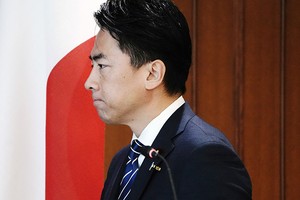Vox Populi, Vox Dei is a daily column that runs on Page 1 of The Asahi Shimbun.
December 21, 2022 at 12:33 JST
 The building where the main office of Asunaro Social Welfare Service Corp. is located in Esashi, Hokkaido (The Asahi Shimbun)
The building where the main office of Asunaro Social Welfare Service Corp. is located in Esashi, Hokkaido (The Asahi Shimbun)
The eponymous protagonist of the 2001 American drama film “I Am Sam” is a Starbucks employee and a single father with an intellectual disability. His mental capacity is that of a 7-year-old.
Sam single-handedly raises his daughter, Lucy, until she reaches school age. However, a child welfare agency deems Sam to be an inadequate parent, and he faces the danger of losing custody of Lucy.
During a custody hearing in court, the prosecutor challenges Sam to the effect, “You really think you can raise (Lucy) in the days ahead? By the time she is 7 or 10 or 13, her level of intelligence will be far more advanced than yours. What on earth are you going to do?”
Unable to express his love for Lucy with his limited vocabulary, Sam repeatedly begs the prosecutor to stop questioning him.
No matter how well-intended, questions posed to someone in a weaker position can drive that individual into a corner from which there is no escape.
I presume that was what occurred at a group home in Hokkaido for people with intellectual disabilities, where eight couples who wanted to get married or live together reportedly “confirmed” their decision not to have children and agreed with the home’s suggestion that they be sterilized.
Were they capable of expressing how they truly felt, though?
After reading the transcript of a news conference where the representatives of the group home operator, Asunaro Social Welfare Service Corp., spoke, I found it hard to understand why the facility did not suggest other options besides having them sterilized.
This pattern reportedly became established around 1996, the year the nation’s eugenics law was amended to ban the forced sterilization of people with disabilities. I want to believe the timing was just a coincidence.
I was surprised to learn that the current group home system does not consider the possibility of its residents giving birth and raising children. This must mirror society’s disinterest in the conditions in which disabled people are living.
In the film, Sam struggles to count coins when paying his bill at a restaurant while other patrons, waiting in line behind him, look at him with unconcealed annoyance.
I held up a metaphorical mirror to my face, wondering if my eyes are as accusatory as theirs.
--The Asahi Shimbun, Dec. 21
* * *
Vox Populi, Vox Dei is a popular daily column that takes up a wide range of topics, including culture, arts and social trends and developments. Written by veteran Asahi Shimbun writers, the column provides useful perspectives on and insights into contemporary Japan and its culture.




















A peek through the music industry’s curtain at the producers who harnessed social media to help their idols go global.
A series based on diplomatic documents declassified by Japan’s Foreign Ministry
Here is a collection of first-hand accounts by “hibakusha” atomic bomb survivors.
Cooking experts, chefs and others involved in the field of food introduce their special recipes intertwined with their paths in life.
A series about Japanese-Americans and their memories of World War II